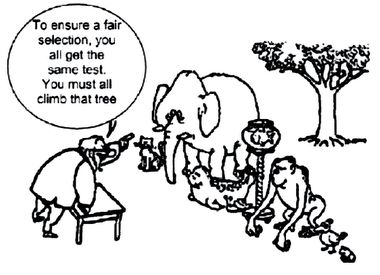Thoughts on self directed learning June 22, 2011
Posted by Null in Academic, HRM, Work Organisations.Tags: Work Organisations
add a comment
What is it with organisational learning? Many authors talk about it; few people know about it; and no employees are being put to implement it.
Organisational learning can be best implemented if the employees are being put into self directed learning. A company that introduces self directed learning for it’s employees will benefit in many ways. Firstly, the company is engaging in delegating the responsibility within the employees by which the learners will find responsibility with less bossing. Secondly, the learners will try to find their own way of learning since every learner does not have the same pace or style of learning. Finally, the learners can contextualise their learning effectively into their work if the learning has been done according to their own self-direction.
Quality or Quantity is always a dillema July 3, 2009
Posted by Null in Business, HRM.Tags: dilemma, performance, Quality, Quantity
4 comments
Organizations, or say managers want their employees or workers to be more productive in respect to their outputs. On the other hand, managers also want that you maintain the product quality. This creates a dissonance in employee minds’. What do the manager really want? Is it quality or quantity?
As a generalized fact we are aware that quality does not go well along quanity. For an instance, just think about an accountant who is being given a limited time frame to complete the profit and loss statement. Addionally if the manager demands that there should not be any single mistake in the analysis, that would be a quandary. So what is optimum solution to this problem? Well it depends on the organizational viewpoint. What is performance for the organization? Is it producing more or producing better?
A GEN Y dilemma on job and social life balance June 25, 2009
Posted by Null in HRM, Movies.Tags: career, cruel leadership, decision making, GEN Y, Hollywood, HRM, job, Movie review, worklife balance
add a comment
The Devil Wears Prada (2006) is a humor yet interesting film based on Lauren Weisberger’s 2003 novel. The two major roles played are Anne Hathaway and Meryl Streep.

The story explores some unheard realities of workplaces that can be real challenging (pain in the ***) for individuals if they don’t fit into the position itself. However, the movie has gone beyond the challenges of fitting into a position. It also explores how bosses can be annoying. But the boss is always right! Right?
The story is based on a young lady named Andrea who studied journalism and dreamt of having a career in journalism. Eventually, fate took her into a different role, a different position, an inflexible workplace environment, and a boss from hell. So do you have what it takes to do any job? You are educated and the issue is whether as a GEN Y, you are willing to sacrifice everything in pursuit of a career or not. Not everyone has that much of patience or should I say talent?
What do we mean by a job or a position? You do a 9-5 duty and do not bring office commitments to home.While some professions such doctors, lawyers, teachers, etc may require us to bring task into home (but that’s flexible). But in the movie/novel it was “so so different” in the job that Andrea was doing in the Runway Magazine. As a GEN Y girl, it may look quite obvious that she will leave the job. But she didn’t, rather sacrificed her social and family relations and especially a freedom of life. But eventually after putting so much of effort into it, she quit. Did she do the right thing? I guess so, because she proved her boss that she’s competent but is not willing to sacrifice everything for career.
Yet, we might find people like Miranda Priestly who will go crazy for a career and forget that they have a life.
Does the term “Fair Selection” exist? April 3, 2009
Posted by Null in HRM.Tags: Equity, HRM
add a comment
People always talk about equity and fair selection when it comes to employment of human resources. But what do we mean by “fair selection”? Does it exist in the corporate sphere? Fairness cannot exist especially in selecting something. You go to a restaurant, choose a menu that suits your appetite and budget, and eventually you don’t select the others. That is being both unfair and fair in a sense because you reject the other menus (unfair) plus you cannot take the others because of your circumstances (fair). Something that might perceive fair to me, might not be fair in the eyes of others. It is how we see things. But a 100% fairness do not exist anywhere in the world. From an organizational perspective, fair selection is barely achievable.

The future of executives April 3, 2009
Posted by Null in HRM.Tags: Credit Crunch, Economic Recession, Job Loss
1 comment so far
Due to the economic recession several millions of jobs are at stake. It seems pretty clear that this time the recession will take over many economies and if the world cannot defend it properly, we will be back to the past for the next 20 years (my assumption). But how do we defend? Spend less? Don’t buy iPods? Eat at Burger King instead of going to a A-La-Carte? Well the so called supersonic economists and financial advisors will advise how to implement the cost-cutting theme at home. Duh! This can be done by laying off a family member, right? At present, we realized that the future of many low income workers are merely at jeopardy.
But what about executives? Will they always lead a class life? Will they always fly a chartered aircraft? I don’t think so. Things will change as said by the world’s greatest Astrologist (Mr. Barack Obama). If the world economy is at despair, they too will suffer in near future. Mr. Obama is predicting that US will never be the same again because there are new entrants in the world super power. I’m not being prejudiced with executives because change is a fact of life.
Watch this interesting video, and see how it looks when executives are waiting to work as a day laborer.
Child Labor & Sweatshops in Bangladesh March 26, 2009
Posted by Null in Bangladesh, Ethics, HRM.Tags: Child labor, Garments, Nike, sweatshop, textile
add a comment
Much has been told about the “Child Labor” and “Sweatshop” issues in newspapers and as well as by human rights activists. But do we really care? I’m afraid, not. We give a damn about these children who work day and nights. We feel pity if a worker is sweating to produce a Nike T-Shirt for us.
The obvious question may come, Why should we care? Aren’t we paying $60 for that shirt? We are being responsible by purchasing the T-Shirt at a higher price. But who gets the money? It’s time now that we as consumers’ be aware about general human rights that every human being on earth deserves. By the way, I’m not a feminist or a leftist. All I’m trying is to aware ourselves that something definite can be done to improve the lives of some poor people who work for our daily commodities.
Selection process is harder than it looks June 7, 2007
Posted by Null in HRM.Tags: HRM, Recruitment, selection
add a comment
We live in a world where the community is more conscious about what businesses do. People are now aware of the procedures used by business organisations. In such a cognisant world, firms need to be careful about their recruitment and selection procedures. A simple discrimination can cost thousands of dollars for a firm. Discrimination can occur in many different ways which includes the job advertisement as well. For instance, if your firm is a pharmaceutical manufacturer and you have advertised for a sales representative where you specified that males are prefered and women need not apply. This results a gender discrimination. There are many women in the world with sales related professions who are equally competent to male sales representatives.
Therefore, when selecting employees for your organisation please be careful about the procedures you use to select. As a matter of fact, selection process itself is a form of discriminating where you select one individual over another based on the preferences you or your firm might have.
Thougths on diversity and Affirmative Action Programs June 3, 2007
Posted by Null in Ethics, HRM.add a comment
The cultural diversity programs or Affirmative Action programs gives us an impression that awareness for the diversity issues can be twofold in many cases. First of all, the purpose of an Affirmative Action is to ensure that disadvantaged groups such as women and ethnic minorities are not excluded from the recruitment and retention of an organisation. Hence the Affirmative Action can help resolve the issues regarding discrimination and workforce diversity. Many might argue that having such an extensive program will not only comply with the workforce laws but also can enhance organisational effectiveness and bring harmony. But on the other hand, too much emphasis on Affirmative Action can victimise other insiders who might feel that they are excluded from the benefits that are provided to the disadvantaged groups, which eventually, can create a new form of discrimination.
Embracing multicultural diversity is indeed a challenging task for an organisation because it can raise multidimensional dilemmas, which eventually can affect the long term goals of an organisation. To embrace diversity, training and awareness should be created among everyone inside the organisation so that issues regarding diversity do not raise questions. In addition, organisations should also be careful that Affirmative Action programs does not put others at disadvantage.
Is skill development important for firms? June 2, 2007
Posted by Null in HRM.add a comment
Skill development may not enhance the competitive advantage of a firm directly as because it is visualised as a short-run development process. But the significance of skill development can be realised if the process is based not only on filling gaps in current skill levels but also assuring the necessary skill levels to motivate employees towards more organisational learning and teamwork. However, it should be also seen as a long term iterative process which can contribute towards the core competencies of a firm and can help building in rare and valuable resources by which organisations can gain competitive advantage. It does not necessarily mean that firms will not survive without skill development but the process should be seen as a potential future return on investment which will help a firm achieve its strategy. Organisations who deliberately overlook the skill development issue may fail to attract and retain talented workforce, which eventually can jeopardize the long term corporate vision. Hence I believe ongoing training and skill development are important tools for building competitive advantage.
“Insider status” in organisations May 31, 2007
Posted by Null in HRM.add a comment
Insiders are considered as the legitimate members of an organisation. They are generally the employees who exist inside the organisational boundaries. ‘Insider status’, which can be sometimes referred as organisational identification or Esprit De Corps, is a conception of an employees’ mind when he/she is being highly identified by the organisation. Although this identification is intangible in nature, it can affect the performance and motivation of employees in an organisation. Thus organisations must address the ‘status’ issue for the insiders if they want to build relationships with their employees. There had not been much scholarly definition of the term ‘insider status’, but most people talk about organizational identification, commitment, Esprit De Corps, and corporate citizenship when talking about “insider status”. But this insider groups or individuals can have quite a large influence in shaping the future of an organisation.
